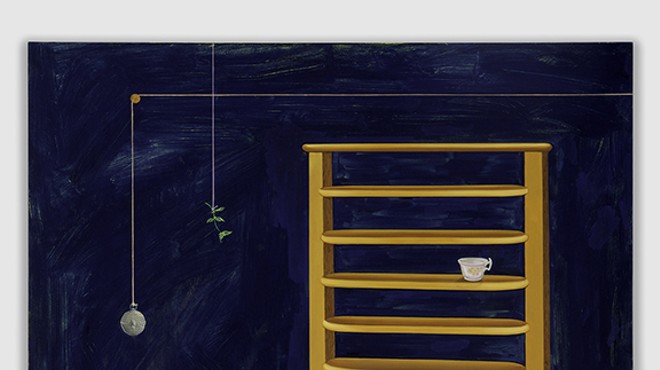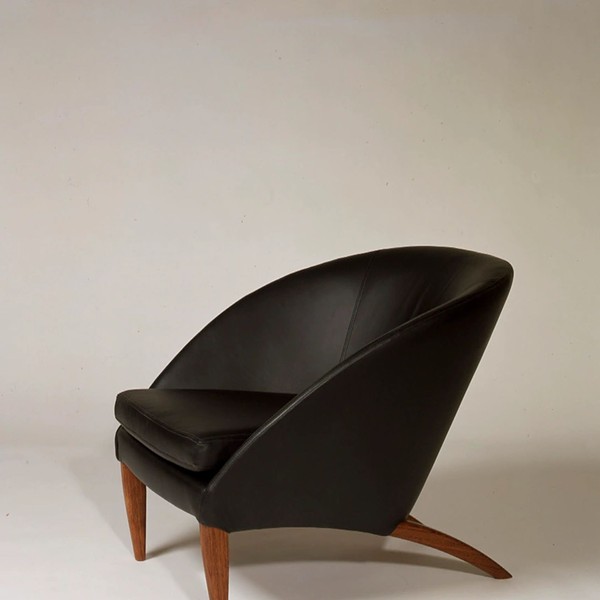Since its founding in 1747 in Manchester, England, the egalitarian spirit of the Shaker sect has espoused an "equality of the sexes" model that supports women in spiritual leadership roles. The progressive nature of the Shaker worldview can be admired for its equity, and artist Caitlin MacBride's Shaker-inspired art expresses an abiding reverence and repositioning of the Shaker temperament for a contemporary audience.
Presented by the Shaker Museum in a pop-up exhibition at the Kinderhook Knitting Mill, "Palm to Poplar: Devotional Labor" includes 11 richly hued paintings by MacBride paired alongside a selection of timeworn Shaker objects that serve as the models and muses for this work. Based in Hudson, MacBride is a professor of painting at Bard College and is represented by Deanna Evans Projects in Manhattan.
Her art engages with cultural artifacts in an exploration of labor, desire, and systems of belief. In 2017, MacBride began researching Shaker material culture through the collection of the Metropolitan Museum of Art, and her focus led her to create the current series on view in Kinderhook. MacBride considers her study of Shaker culture as vital to her knowledge of American art, most notably the Shaker impact on Modernism. "Learning about the Shakers helped fill in a gap I felt like I'd missed in art history," she says.
MacBride's work offers a compelling peek at the core themes in Shaker aesthetics: pattern, isolation, tension, and piety. The imagined conversation happening between the aged Shaker objects in this show—most of them dating from the 1950s—and MacBride's painterly reconsideration of these objects reveals a surrealist-cum-realist atmosphere, one that infuses her work with a strong psychological edge.
MacBride experiments with presenting the Shaker objects as sober records of time versus orchestrating them to dig into our psyche. The painting Bow and Be Simple (2024), for example, is a beautiful rendering of an adjustable wood object used by Shakers to create their classic rounded boxes set against a bright yellow background and painted on a section of door—it is straightforwardly handsome as such.
In other artworks, she tinkers with the cerebral intensity of these forms. With Resistance Razmataz (2002), for example, MacBride has painted a perfect Shaker collating shelf and has carefully positioned five delicate objects on or in relation to this enduring piece of furniture. Among those objects, a small round tea-holder suspended in the air appears to be yearning for the little white saucer just inches away, hinting at notions of unsated consummation. In North (2021), an empty blue bonnet is alive as a gentle breeze animates the blue ribbons that cascade down from it while three small wheels turn endlessly to the left of this composition. The effect is haunting and illuminates the familiar emptiness of actual living, and MacBride gracefully catches our bare attention with these absorbing moments.
Arriving in the US in 1774, the Shaker movement peaked at 19 communities in the Northeast, Ohio, and Kentucky in the mid-19th century. Today there is only one active Shaker village in New Gloucester, Maine, while most former Shaker communities exist as time capsules, including the Shaker Museum in Chatham. We can appreciate MacBride as an artist, anthropologist, and archivist devoting herself to the preservation of Shaker imagery. For MacBride, the connection between art and artifacts reveals a certain "worship factor" that imbues all objecthood—both antiquated and extant—with an unspoken charm, and her balanced paintings reveal this unabashed affinity. "Art is always most interesting to me when it embodies what others might see as contradictions," says MacBride. "I felt like I'd found my artistic lineage when I found the Shakers."



















